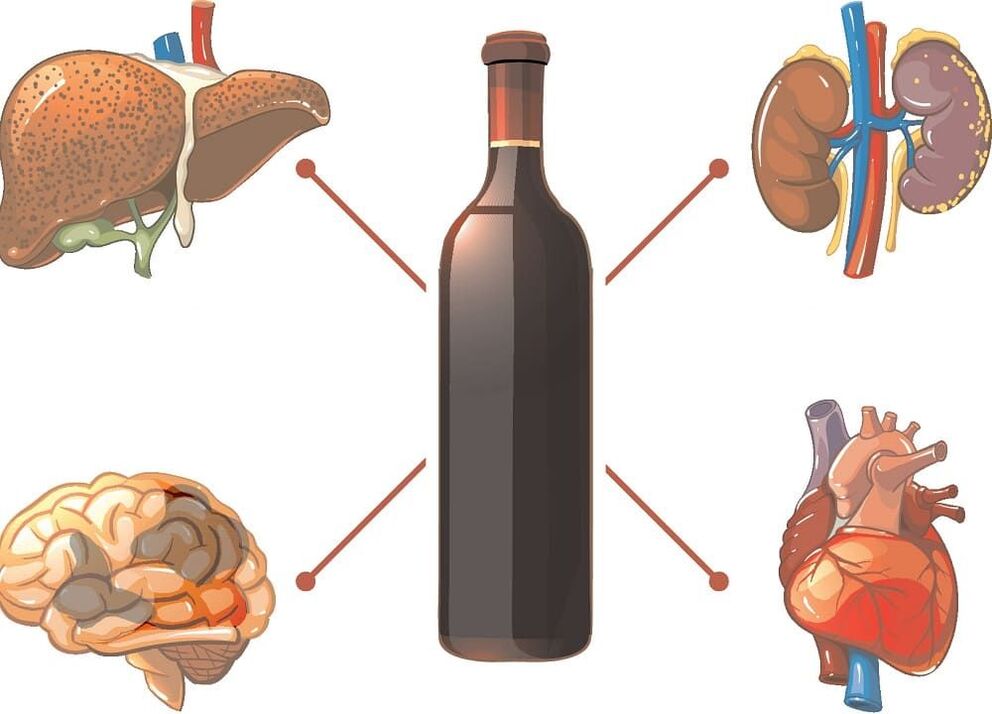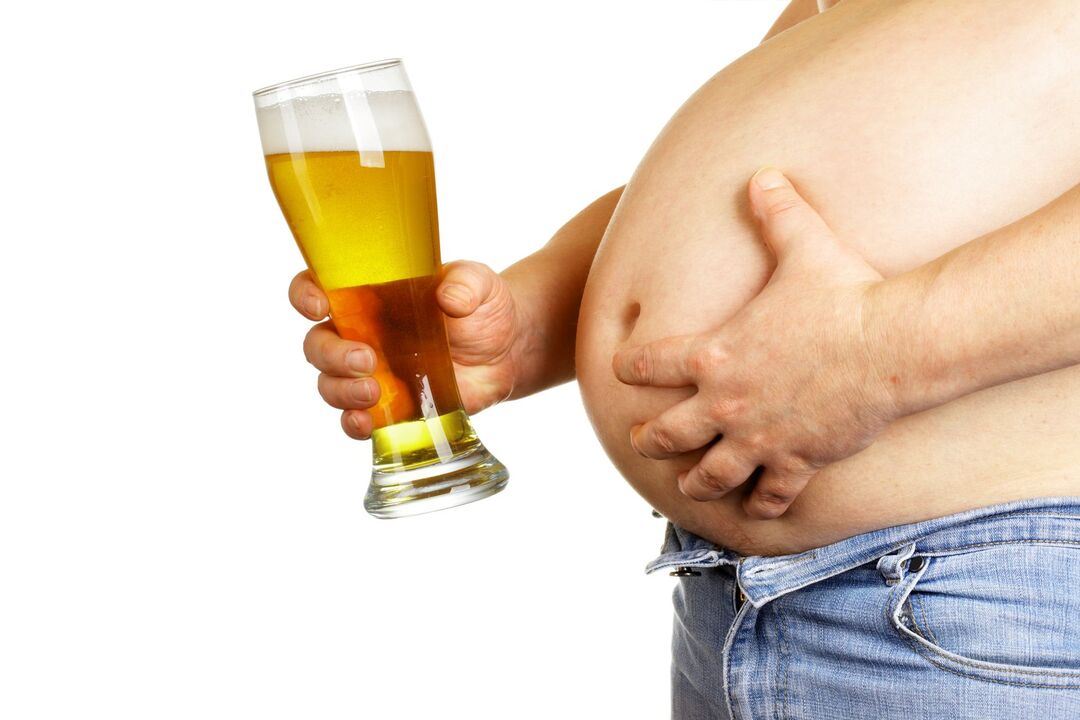Alcohol is one of the leading causes of death worldwide. Today, its use is actually epidemic and has many serious consequences.
Many alcoholics drink large amounts of alcohol every day and experience negative health consequences. Therefore, the question of how long alcoholics live becomes especially relevant.
In this article, we will attempt to explore this topic based on scientific research and practitioner experience. We will try to show a real picture of the impact of alcohol consumption on life expectancy and what to do to increase your chances of living a long life.
Why is drinking alcohol harmful to your health?
Alcohol destroys cells and the body
Alcohol is harmful to your health because it destroys the body's cells and tissues. Regular consumption of alcohol leads to diseases of the liver, cardiovascular system, stomach and other organs. In addition, alcohol weakens the immune system and slows down the body's metabolic processes.
Alcohol worsens mental and physical health
Alcohol is harmful to your health because it can impair attention, memory and thinking. Alcohol can also cause dizziness, cramps, and head or body pain. Regular consumption of alcohol can lead to a deterioration in emotional state, which can cause pain and suffering for the person and their loved ones.
Alcohol can lead to addiction

Alcoholism is one of the most serious consequences of alcohol consumption. Regular alcohol consumption can lead to psychological and physical dependence, which can lead to serious social and health consequences. People suffering from alcoholism experience difficulties in their personal, family and professional lives, and may also be prone to breaking the law and engaging in aggressive behavior.
Result:
Alcohol is harmful to your health. Regular alcohol consumption can lead to serious physical and mental health consequences, as well as addiction and social problems. Therefore, it is important to take care of your health and drink alcoholic beverages in moderation, or even give it up altogether.
How does alcohol affect the body?
Alcohol has a multifaceted effect on the human body, completely covering all its systems and organs. It causes disruptions in the nervous, cardiovascular, endocrine, digestive and other systems, which can ultimately lead to various diseases and serious consequences for the body.
Alcohol has a toxic effect on the nervous system, which manifests itself in poor coordination of movements, irritability, emotional instability, memory impairment and decreased concentration. In addition, it has a negative effect on the cardiovascular system, causing increased blood pressure, heart rhythm disturbances and increased blood cholesterol levels.
Alcohol also has a negative effect on the digestive system, causing problems with the liver, pancreas and stomach. This can lead to the development of diseases such as gastritis, pancreatitis and liver cirrhosis.
It is important to note that alcohol consumption can lead to dependence. Alcoholics feel a constant craving for alcohol and cannot control their consumption. Long-term alcohol consumption can lead to serious illness and even death.
- Alcohol has a toxic effect on the nervous, cardiovascular and other systems of the body;
- alcohol causes disruptions in the digestive system and can lead to various diseases;
- Alcohol consumption can lead to addiction and serious illness.
Alcohol addiction: what is it and how does it manifest?
What is alcohol addiction?
Alcohol dependence is a chronic disease associated with the physical and mental need to drink alcohol, despite its negative consequences. People suffering from alcohol dependence cannot control their drinking and continue to use it even when problems arise in their health, work, relationships, and other areas of life.
How does alcohol addiction occur?
Alcohol dependence appears gradually, due to regular and excessive consumption of alcohol. Alcohol affects the nervous system, causing a feeling of euphoria and relaxation. Little by little, the alcoholic's body adapts to the constant effects of alcohol, and to get the same dose, it needs more and more alcohol. In addition, alcohol consumption leads to a decrease in the level of hormones responsible for feeling happy, which worsens mood and causes depression. The result is a vicious cycle where a person drinks alcohol to gain a feeling of satisfaction, which is very quickly replaced by discomfort and a desire to drink even more.
Signs of alcohol dependence
Signs of alcohol dependence can appear differently in different people, but the most common symptoms include:
- Inability to control alcohol consumption
- Having a constant desire to drink
- Giving up normal activities in favor of drinking alcohol
- Lots of time spent with alcohol and alcoholics
- Lack of interest in other types of entertainment and fun
- Disturbances in sleep, eating and other vital functions due to alcohol
- Damage to relationships with loved ones
If you notice these symptoms in yourself or a loved one, seek help from an addiction specialist to prevent the development of alcohol dependence and its negative consequences.
Consequences for alcoholics
Alcoholismis a disease that can cause various serious consequences for human health. Serious illnesses, mental disorders, neurological problems are just a few of them.
Organs affected by alcoholism:
- Liver– in case of prolonged alcohol intoxication, cirrhosis of the liver occurs, which can lead to death.
- Heart and blood vessels– Alcoholism increases the risk of various cardiovascular diseases, such as heart attacks and hypertension.
- Stomach and intestines– alcohol causes irritation of the mucous membranes, which can lead to stomach ulcers and various digestive disorders.
- The nervous system– Alcoholism can cause nervous system disorders such as paralysis and impaired motor coordination.
Additionally, alcoholism can lead to mental disorders such as depression and nervous exhaustion.
It is important to remember that alcohol is a poison and stimulates various diseases. Alcoholics need professional help to overcome their addiction and stay healthy.
Which people addicted to alcohol can live to old age?

Scientists have long noticed that alcohol dependence significantly reduces life expectancy. But despite this, there are cases when alcoholics live to old age.
Statistics show that alcoholics who begin treatment for their addiction at a young age are more likely to survive into old age. Additionally, alcoholics who do not have health problems and know how to refrain from drinking alcohol have a better chance.
Some alcoholics who live to old age say they have always controlled their drinking and never exceeded the limits. It is also important that the alcoholic's life be filled with interests and concerns that take precedence over drinking.
However, it should be noted that alcohol addiction is still a serious problem that requires a quick solution. So, even though some alcoholics live to a ripe old age, that doesn't mean that alcohol addiction hasn't had a negative impact on their health and lives.
What affects the life expectancy of an alcoholic?
Chronic alcohol consumption
Chronic alcohol consumptionis the main factor determining the life expectancy of an alcoholic. This is due to the fact that alcohol has a destructive effect on the organs and systems of the human body and can lead to many diseases and pathologies.
Amount of alcohol consumed
Amount of alcohol consumedalso plays an important role in determining the life expectancy of an alcoholic. The more alcohol a person consumes, the more damage they cause to their body. For example, people who drink more than two standard drinks per day are at increased risk of developing cirrhosis, cancer and other diseases.
Presence of concomitant diseases

Presence of concomitant diseasescan also affect an alcoholic’s life expectancy. For example, if a person already suffers from diseases of the liver, heart, lungs and other organs, drinking alcohol can accelerate the development of these diseases and lead to death earlier than usual.
Sex and age
Sex and agecan also impact an alcoholic’s life expectancy. For example, women are generally more sensitive to the effects of alcohol than men and may suffer more serious consequences from drinking.
In general, the life expectancy of an alcoholic depends on many factors. But the main role lies in the consumption of alcohol and its quantity.
Symptoms of alcoholism in the final stage

Alcoholism is a chronic disease that consists of constant dependence on alcohol. The final stage of alcoholism is characterized by serious health and behavioral problems.
One of the main symptoms of alcoholism in the final stage is a lack of understanding of the world around us and a violation of the mental state. Patients experience low self-esteem, a strong reaction to stopping alcohol consumption and external imitation of their feelings.
Representatives of the final stage of alcoholism experience a constant desire to drink and therefore always consume alcohol at every opportunity. They lose interest in everything except drinking, and the functioning of internal organs, nervous system and digestion is disrupted.
Often the painful cycle ends in premature death. It is therefore very important to start treatment quickly and, if possible, to interrupt this dangerous addiction.
- Symptoms of alcoholism in the final stage:
- Loss of control over alcohol consumption;
- Serious health and behavioral problems;
- Lack of understanding of the world around us and altered mental state;
- Low self-esteem;
- Constant desire to drink;
- Disorders of internal organs, nervous system and digestion.
Methods to combat alcohol addiction
Drug therapy
One of the most common methods of combating alcohol addiction is drug therapy. This is the use of medications that help reduce the desire to drink or cause discomfort when drinking alcohol. For example, a medicine containing the active ingredient disulfiram causes nausea and dizziness when consuming even small doses of alcohol.
Psychotherapy
Psychological methods also help in the fight against alcohol addiction. Individual and group psychotherapy sessions allow you to understand the causes of alcohol dependence, learn to cope with stress and control behavior.
Rehabilitation programs
Rehabilitation programs are designed to help people suffering from alcohol addiction. These may include inpatient treatment, drug treatment center programs, religious programs, etc. Rehabilitation not only allows you to stop drinking alcohol, but also to learn to live without it, to regain family and friendly relationships and to regain health.
Self-help
This is not a method, but a direction in the fight against alcohol addiction. Self-help is a person's active participation in their own treatment. This could include stopping drinking alcohol, exercising, meditating, joining support groups, journaling, etc. What helps one may not help another, so self-help requires discovery and experimentation.
Excretion from the body
Withdrawal can help with alcohol addiction, but it is not a method for everyone. It can be detoxification (body cleansing procedure), nutrition, herbal medicine, etc. Removal from the body does not solve the main problem - psychological dependence, therefore it must be combined with other methods.
Conclusion:There are many methods to combat alcohol addiction, and each of them has its own advantages and disadvantages. The best approach is to combine several methods. It's never too late to start fighting alcohol addiction, and specialists and your loved ones will help you.
How to Overcome Binge Drinking: Tips and Tricks
Excessive alcohol consumption is a serious illness characterized by a strong desire to drink alcohol and an inability to stop. But it is possible to get out of excessive alcohol consumption, and you can do it yourself, without medication.
- Determine the causes of excessive alcohol consumption.The first step to overcoming excessive drinking is recognizing that you suffer from it and identifying the reasons that led to it. It could be stress, depression, conflicts in your personal life or at work, etc.
- Plan your daily routine.A strict daily routine will help you avoid the temptation to drink the expected amount of alcohol. It is important to pay attention to healthy sleep, a balanced diet and physical activity.
- Search for activities.On the one hand, excessive alcohol consumption brings euphoria and pleasure, on the other hand, it destroys health and personal relationships. It is therefore important to find an activity that can replace alcohol. This could be a passion for sports, reading, learning new languages or musical instruments.
- Find support.Overcoming excessive drinking on your own is difficult, so it's important to find support from friends, family, or professionals. Do not hesitate to seek help from a psychologist, narcologist or support groups.
- Make an appointment with a doctor.Although in some cases you can do without drug treatment, in most cases the right specialist will help you cope with excessive alcohol consumption more effectively and quickly. Don't be embarrassed to seek help from a doctor.
Question Answer:
How does long-term alcohol use affect life expectancy?
Long-term alcohol consumption significantly reduces life expectancy. According to a 2018 study, people who drink 2 to 3 standard drinks per day live on average 1 to 2 years less than those who don't drink at all. The increase in mortality increases with increasing consumption of alcoholic beverages.
Can alcoholics live longer than those who don't drink?
This is unlikely because alcoholism is associated with the risk of serious diseases such as liver cirrhosis, stroke and cancer. These diseases tend to shorten life expectancy.
Which alcohol is least harmful to your health?
No alcoholic beverage is healthy, but some drinks, like red wine, contain antioxidants that may have a positive effect on heart health. However, if you regularly consume red wine, it can lead to alcoholism and increase the chances of developing other diseases.
Is there a certain period of time when you can drink alcohol without harming your health?
There is no specific period during which you can drink alcohol without seriously harming your health. Even moderate alcohol consumption can increase the risk of various diseases, including cancer and heart disease. The best solution is therefore to completely avoid drinking alcohol.
Is there a way to reduce the impact of alcohol on your health?
In general, you can reduce the health effects of alcohol by drinking fewer drinks or reducing the frequency of your drinking. If you already have a problem with alcoholism, it is important to reach out to professionals for support and treatment.
Can genes influence the life expectancy of alcoholics?
Yes, the genes of alcoholics can play a role in life expectancy. People with certain genes and body characteristics may be at greater risk of developing alcohol dependence or developing certain diseases as a result of drinking alcohol. However, this does not necessarily mean that alcoholics with this genetic code have a shorter life expectancy. This may again depend on the amount of alcohol you drink and other factors.
How to stay healthy while drinking alcohol
Practice moderation
If you regularly drink alcohol, it is important to understand that excessive consumption can have a negative impact on your health. To maintain your health when drinking alcohol, you must exercise moderation. Choose strong drinks containing no more than 40% alcohol, drink them in small doses and no more than twice a week.

Drinking alcohol in combination with food
To reduce the negative effects of alcohol on the body, it is recommended to consume it in combination with food. Eating allows alcohol to stay in the stomach, leading to a milder effect and reducing the risk of poisoning.
Drink clean water
It is important to remember that alcohol has a dehydrating effect on the body, so it is necessary to drink enough clean water. You can drink water before, during and after drinking alcohol, which will help replenish lost fluids and prevent dehydration.
Do not mix different types of alcohol
Mixing different types of alcohol can have serious health consequences. This can result in a large dose of a toxic substance that affects the body. Avoid mixing different types of alcohol and limit yourself to one drink at a time.
Don't drink alcohol when you're sick
Drinking alcohol while sick can make your condition worse. Additionally, alcohol can interact with your medications, which can also negatively impact your health. Therefore, if you have an infection, flu or other illness, you should temporarily give up alcohol.































